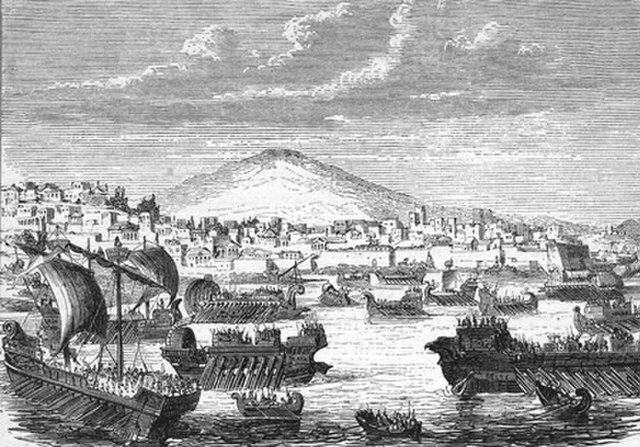Survival of the fittest
The siege and conquest of the island of Melos by the Athenians

Nineteenth-century illustration of the Athenian fleet. This fleet, reinforced by contingents from allied cities and islands, guaranteed Athens control of the seas. This meant that the polis considered itself a great power that could impose its supremacy on every island. Image from commons.wikimedia.org
Melo was a small island located in the Cyclades archipelago, inhabited by a population of Dorian origin. Its international status at the time of the Peloponnesian War is unclear. In 416 B.C., under the initiative of Nicias, Athens became interested in the island. Ambassadors were sent to Melo, presenting Athenian demands: Melo was to submit to Athens, which refused to accept the island's desire for neutrality. In fact, allowing a small but strategic island like Melo (situated off the coast of the Peloponnese) to remain neutral would make Athens appear weak.
From the dialogue between the Athenian ambassadors and the Melians, reported by Thucydides, the Athenian mindset of the time is evident: terms like "justice" and "the right to autonomy" had no place when it came to wars and relations between states, as only power dynamics between nations mattered. The Athenians admitted that the only instance where one could speak of "rights" was when two powers of equal strength were involved, which was not the case between Melo and the Athenian empire.
The Athenians threatened dire consequences in case of refusal, but the Melians did not accept their terms, trusting in divine justice or an intervention from the Spartans, to whom they felt connected by their shared Dorian heritage. None of this came to pass: the fleet of the Delian League, led by generals Cleomedes and Tisias, besieged the island. The resistance of the inhabitants lasted longer than expected and was only broken thanks to a traitor. The treatment of the population was harsh: all adult men were sentenced to death, the women and children were deported as slaves, and a colony of 500 Athenian settlers was sent to the island.
The Spartans arrived only 11 years later, when General Lysander occupied the island and expelled the Athenians, allowing the few surviving Melians to return. Xenophon also recounts that, with defeat looming, the Athenians were terrified by the thought that the Spartans might do to them what they had done to the Melians.
Book: Introduzione alla storiografia greca , Marco Bettalli, Carrocci, 2021
Book: Storia greca I: la Grecia arcaica e classica , Hermann Bengston, il Mulino, 1985
Dialogo degli ateniesi e dei melii sulla giustizia in guerra , Tucidide (translation by F. Ferrari)
2025-09-08
Salvatore Ciccarello
